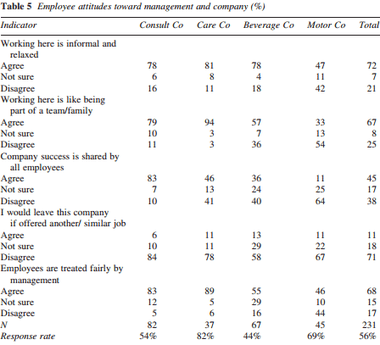It used to be that large companies offered security and perks that small companies couldn’t live up to. However, those old stereotypes are disappearing as small companies (past the early stage of development) are stepping up with equal or better contracts.
What is a “small company” anyway?
There’s the micro company (1 – 10 employees) and then the small company (<50 employees) (European Union). In the USA it depends more on the firm turnover. You can take a look at the overview of how every country in the world defines a small company here. Small companies are often lumped in with medium companies and called SMEs (small medium enterprises).
What are scientists saying about small companies?
From this study, we can see that there is a shift from “climbing the corporate ladder” to searching for fulfilling and meaningful jobs. This is healthy — there is only so much room at the top in any case. It also means people aiming for jobs that they are happier in, and happier employees mean better quality work and higher proclivity to voluntarily lend a hand in times of crisis or be more flexible. Perhaps lessons handed down from our parents in the 70s, 80s, and 90s have pushed us to find more appropriate jobs, rather than jobs that have a high financial reward. Or perhaps the expansion of the worldwide middle class has impacted on choosing our careers less out of fear and more out of satisfaction.
What makes small companies so successful at being great places to work?
The secret sauce for a great small company seems to be how it is managed. Logically, it is easier to properly manage a small group of people than a large group. Here’s a table from another study that defined five statements that impacted on employee satisfaction (ref: International Human Resource Management Journal, 2007):
- Working here is informal and relaxed.
- Working here is like being part of a team/family.
- Company success is shared by all employees.
- I would leave this company if offered another/similar job.
- Employees are treated fairly by management.
The conclusions from this show that people generally:
don’t want a highly-formalized workplace. have an emotional need to feel like an integral part of the success of the company. need to feel appreciated and close to their work colleagues. react well if they perceive management to treat everyone equally.
Most of your (fully-functioning) adult life you are going to be at your job. It should be the perfect fit. A survey of 200 UK graduates commissioned by Give A Grad A Go found:
91% believed big corporations paid more. 79% felt they provided greater job security. 74% felt they offered better career progression.
But they felt that SMEs:
encouraged creativity in the workplace (95%). provided greater job satisfaction (82%). encouraged a better work ethic (75%). provide a better work-life balance.
Does management notice me? Not only will working in a small company give you access to all levels of management, but decisions will be made faster and progression will be more visible. Your part in the operation will be more obvious and therefore more motivating. You won’t be restricted by department or hierarchy. Ideas on the fly can be pitched and discussed without needing to book formal meetings with the boss-man. The inevitable variety of the job will also keep your mind stimulated (and improve your general learning capabilities). AND — you get to skip all those corporate networking events :D


